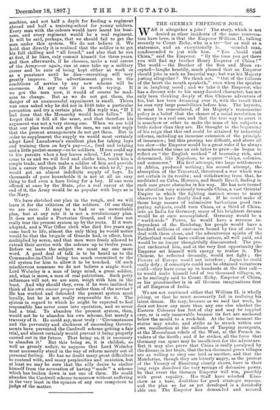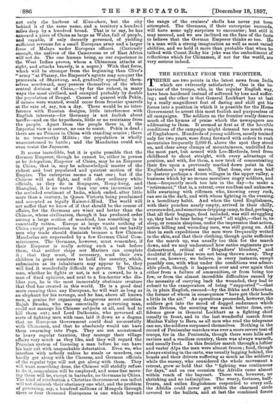THE GERMAN EMPEROR'S JOKE.
WAS it altogether a joke ? The story, which is not denied as other incidents of the same conversa- tion have been, is that the Emperor William IL, talking recently to Count Zichy, who is a trp—sller as well as a statesman, and an exceptionally le... -wended man, condescended to jest with him. "You ..hould visit China," said the Emperor. "By the time you get there you will find my brother Henry Emperor of China !" The world— the Brother of the Sun and Moon ex- cepted—laughs heartily, much pleased that an Emperor should joke in such an Imperial way; but was his Majesty jesting altogether ? We think not. "Out of the fullness of the heart the mouth speaketh," even when the speaker is in laughing mood ; and we take it the Emperor, who has a dreamy side to his many-faceted character, has not only been thinking deeply of this Chinese adventure of his, but has been dreaming over it, with the result that he sees very large possibilities before him. The keynote, it must be remembered, of his Majesty's transtnarine policy is a belief that the chance of a social revolution in Germany is a real one, and that the true way to avert it is somehow or other to make the mass of his subjects a little richer than they are. He thought in the beginning of his reign that this end could be attained by industrial reforms, including an immense extension of the principle of insurance ; but this proving too difficult, and above all too slow—the Emperor would be a great ruler if he always remembered the time an oak takes to grow—he began to reflect on "the English method" of becoming rich, and. determined, like Napoleon, to acquire "ships, colonies, and commerce." His first attempt, two large settlements in Africa, produced nothing ; his second attempt, the absorption of the Transvaal, threatened a war which was not certain in its results ; and withdrawing from that, he meditated on Cuba, Morocco, and South Brazil, finding in each case grave obstacles in his way. He has now turned his attention very seriously towards China, a vast Oriental Empire in which the fighting instinct seems to many observers to have finally died out. If he could make of those huge masses of submissive barbarians good tax- paying subjects, could turn China, or a third of China, into an India for Germany, many of his brightest dreams would be at once accomplished. Germany would. be a "world-wide" Power, he would have a revenue in- dependent of the Reichstag, his people would. have a hundred millions of customers bound by ties of steel to deal with them alone, and the adventurous spirits of the Fatherland would have endless careers, all well paid, and would be no longer thoughtfully discontented. The pro- ject enchanted him, and at the very first opportunity the Emperor set himself with energy to realise it. The Chinese, he reflected dreamily, would not fight ; the Powers of Europe would not interfere ; Japan he could easily defy ; if conscripts could not be obtained volunteers could—they have come up in hundreds at the first call— he would make himself lord of ten thousand villages, or, as he smilingly said to Count Zichy, Emperor of China, as his grandmother is in all German imaginations first of all Empress of India.
We are not convinced either that William II. is wholly joking, or that he must necessarily fail in realising his latest dream. He may, because as we said last week, he does not know any more than any one else whether the Eastern Colossus has feet of clay and may be toppled over, or is only immovable because its feet are anchored below the mould to a rock-bed. At the last moment the statue may awake, and strike as he struck within our own recollection at the millions of Taeping insurgents, at the Mussulman rebels of the West, at the French in- vaders of the South; and if he strikes, all the force that Germany can spare may be insufficient for the adventure. But it may also prove that China is really paralysed by the disease in her brain, that the ten thousand green villages are as willing to obey one lord as another, and that the Mandarins, though they are bitterly angry, as the protest of the Viceroy of Shantung clearly shows, have in their long reign dissolved the very springs of defensive power. In that event the German Emperor will win, possibly with great rapidity. His Staff have selected Kiao- chow as a base, doubtless for good strategic reasons, and the plan so far as yet developed is a decidedly able one. The Emperor has demanded and secured not only the harbour of Kiao-chow, but the city behind it of the same name, and a territory a hundred miles deep by a hundred broad. That is to say, he has annexed a piece of China as large as Wales, full of people, and capable, if only decently governed, of yielding sufficient revenue for a small European army and a larger force of Malays under European officers. (Curiously enough, the natives of the Cameroons or of East Africa will not do. The one human being, as our experience in the West Indies proves, whom a Chinaman attacks at sight, and attacks bravely, is a negro.) With that force, which will be stronger from the beginning than Clive's "army "at Plassey, the Emperor's agents may conquer the peninsula of Shantung, and, gradually spreading them- aelves southward, may possess themselves of the whole central division of China,—by far the richest, in many ways the most civilised, and occupied probably by double the population of Bengal. Causes of quarrel with Pekin, if causes were wanted, would occur from frontier quarrels at the rate of, say, ten a day. There would be no inter- ference with Russian designs, little interference with English interests—for Germany is not foolish about tariffs—and on the hypothesis, little or no resistance from the people. Apart from the people there is, if the Imperial view is correct, no one to resist. Pekin is dead ; there are no Princes in China with standing armies ; there is no trustworthy Militia ; the population is wholly unaccustomed to battle ; and the Mandarins could not even resist the Japanese.
It seems incredible, but it is quite possible that the German Emperor, though be cannot be, either in person or by delegation, Emperor of China, may be an Emperor in China, that is, may be acknowledged master of the richest and best populated and quietest section of the Empire. The enterprise seems a vast one ; but if the Chinese will not fight, and will obey ordinary white officials, as they do in Singapore, Hong-kong, and Shanghai, it is no vaster than our own incursion into the secluded continent of India, which ended, after little more than a century, in Queen Victoria being proclaimed and accepted as legally Kaiser-i-Hind. The world will not suffer that we know of if that should be the course of affairs, for the Germans are wiser and better than the Chinese, whose civilisation, though it has produced order among a large section of mankind, has something in it essentially rotten. Europe at large wants nothing of China except permission to trade with it, and one hardly sees why trade should diminish because a few Chinese Mandarins are superseded by a few German Chief Com- missioners. The Germans, however, must remember, if their Emperor is really setting such a task before them, that neither ships nor Marines can complete it ; that they must, if necessary, send their own children in great numbers to hold the country, which, submissive as its inhabitants may appear to be, they will find it wonderfully difficult to govern. The China- man, whether he fights or not, is not a coward, he is a man of fixed opinions, and next to a fox-terrier who dis- likes you, he is the most immovably obstinate creature that God has created in this world. He is a good deal more cunning than any European, he will wait as long as an elephant for his revenge, and he has, above all known men, a genius for organising dangerous secret societies. Rajah Brooke, who was essentially a governing man, could not manage his Chinese subjects at all, and had to kill them out ; and Lord Dalhousie, who governed all sorts of fighting men with ease, laid it down as a dogma that no European Government could deal successfully with Chinamen, and that he absolutely would not have them swarming into Pegu. They are not accustomed to heavy regular taxation, they manage their village affairs very much as they like, and they will regard the Prussian system of licensing a man before he can have his hair cut with unspeakable detestation. Even we, who interfere with nobody unless he steals or murders, can hardly get along with the Chinese, and German officials of the regular type will not get along with them. They will want something done, the Chinese will stolidly refuse to do it, compulsion will be employed, and some fine morn- ing there will be, except in barracks, no Germans in China. The kind of retribution a Christian Government can inflict will not diminish their obstinacy one whit, and the problem of governing, say, a hundred millions of Mongols through three or four thousand Europeans is one which beyond the range of the cruisers' shells has never yet been attempted. The Germans, if their enterprise succeeds, will have some ugly surprises to encounter ; but still it may succeed, and we are inclined on the face of the facts to believe that the German Emperor thinks so too. He is a man with a strong imagination as well as most varied. abilities, and we hold it more than probable that when he talked with Count Zichy his joke was the embodiment of reflections which for Chinamen, if not for the world, are very serious indeed.







































 Previous page
Previous page